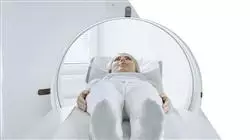University certificate
The world's largest faculty of nursing”
Introduction to the Program
A program that will train you in the field of biomedical image analysis and the control of socio-health data, with the goal of optimizing medical care"

One of the most outstanding advantages that biomedical imaging offers to the clinical branch is to minimize surgical intervention in patients. This will not only improve medical processes in the area of surgery, but will also protect those affected who, due to parallel problems, cannot be operated on. Additionally, the incorporation of Big Data has made it possible to contrast heterogeneous information from different clinical centers, which has been very useful on a global level with COVID. Given the growing demand in the health care labor market for professionals who can adapt to new advances and know how to manage changes in primary and secondary care, specialists have been faced with the need to extend their field of action towards telemedicine.
In response to this professional demand, TECHhas developed a comprehensive program in Biomedical Image Analysis and Big Data in E-Health aimed at graduates in Nursing. In this way, students who receive the program will have a Relearning methodology that will avoid long hours of study and will enable them to assimilate the concepts in a simple and progressive way.
TECHhas also called on a team of experts who will not only transmit the theoretical knowledge of this program to the graduates, but will also be able to share with them their experiences in the sector and the real scenario of action. Thanks to their collaboration, students will have at their disposal a direct communication channel through which they will be able to solve all their doubts regarding the syllabus. This is a brand new academic experience for professionals who are looking for excellence and adapted instruction with experts in telemedicine.
Sign up to learn about the advantages of nano-robots in identifying and fighting cancer cells"
This Postgraduate diploma in Biomedical Image Analysis and Big Data in E-Health contains the most complete and up-to-date scientific program on the market. The most important features include:
- The development of practical cases presented by experts in biomedical imaging and databases
- The graphic, schematic, and practical contents with which they are created, provide practical information on the disciplines that are essential for professional practice
- The practical exercises where the self-evaluation process can be carried out to improve learning
- Its special emphasis on innovative methodologies
- Theoretical lessons, questions to the expert, debate forums on controversial topics, and individual reflection assignments
- Content that is accessible from any fixed or portable device with an Internet connection
Thanks to TECH, you will learn more about in radiology and the tools such as SPECT and PET that intervene in medicine"
The program’s teaching staff includes professionals from the sector who contribute their work experience to this educational program, as well as renowned specialists from leading societies and prestigious universities.
Its multimedia content, developed with the latest educational technology, will allow the professional a situated and contextual learning, that is, a simulated environment that will provide an immersive training programmed to train in real situations.
The design of this program focuses on Problem-Based Learning, in which the professional will have to try to solve the different professional practice situations that will arise throughout the academic course. For this purpose, the student will be assisted by an innovative interactive video system created by renowned experts.
Delve into the telemedicine paradigm and understand the benefits in the care of patients with infectious diseases"

Delve into the intricacies of Big Data in public health to address risk prediction and personalized medicine"
Why study at TECH?
TECH is the world’s largest online university. With an impressive catalog of more than 14,000 university programs available in 11 languages, it is positioned as a leader in employability, with a 99% job placement rate. In addition, it relies on an enormous faculty of more than 6,000 professors of the highest international renown.

Study at the world's largest online university and guarantee your professional success. The future starts at TECH”
The world’s best online university according to FORBES
The prestigious Forbes magazine, specialized in business and finance, has highlighted TECH as “the world's best online university” This is what they have recently stated in an article in their digital edition in which they echo the success story of this institution, “thanks to the academic offer it provides, the selection of its teaching staff, and an innovative learning method aimed at educating the professionals of the future”
A revolutionary study method, a cutting-edge faculty and a practical focus: the key to TECH's success.
The most complete study plans on the university scene
TECH offers the most complete study plans on the university scene, with syllabuses that cover fundamental concepts and, at the same time, the main scientific advances in their specific scientific areas. In addition, these programs are continuously being updated to guarantee students the academic vanguard and the most in-demand professional skills. In this way, the university's qualifications provide its graduates with a significant advantage to propel their careers to success.
TECH offers the most comprehensive and intensive study plans on the current university scene.
A world-class teaching staff
TECH's teaching staff is made up of more than 6,000 professors with the highest international recognition. Professors, researchers and top executives of multinational companies, including Isaiah Covington, performance coach of the Boston Celtics; Magda Romanska, principal investigator at Harvard MetaLAB; Ignacio Wistumba, chairman of the department of translational molecular pathology at MD Anderson Cancer Center; and D.W. Pine, creative director of TIME magazine, among others.
Internationally renowned experts, specialized in different branches of Health, Technology, Communication and Business, form part of the TECH faculty.
A unique learning method
TECH is the first university to use Relearning in all its programs. It is the best online learning methodology, accredited with international teaching quality certifications, provided by prestigious educational agencies. In addition, this disruptive educational model is complemented with the “Case Method”, thereby setting up a unique online teaching strategy. Innovative teaching resources are also implemented, including detailed videos, infographics and interactive summaries.
TECH combines Relearning and the Case Method in all its university programs to guarantee excellent theoretical and practical learning, studying whenever and wherever you want.
The world's largest online university
TECH is the world’s largest online university. We are the largest educational institution, with the best and widest online educational catalog, one hundred percent online and covering the vast majority of areas of knowledge. We offer a large selection of our own degrees and accredited online undergraduate and postgraduate degrees. In total, more than 14,000 university degrees, in eleven different languages, make us the largest educational largest in the world.
TECH has the world's most extensive catalog of academic and official programs, available in more than 11 languages.
Google Premier Partner
The American technology giant has awarded TECH the Google Google Premier Partner badge. This award, which is only available to 3% of the world's companies, highlights the efficient, flexible and tailored experience that this university provides to students. The recognition as a Google Premier Partner not only accredits the maximum rigor, performance and investment in TECH's digital infrastructures, but also places this university as one of the world's leading technology companies.
Google has positioned TECH in the top 3% of the world's most important technology companies by awarding it its Google Premier Partner badge.
The official online university of the NBA
TECH is the official online university of the NBA. Thanks to our agreement with the biggest league in basketball, we offer our students exclusive university programs, as well as a wide variety of educational resources focused on the business of the league and other areas of the sports industry. Each program is made up of a uniquely designed syllabus and features exceptional guest hosts: professionals with a distinguished sports background who will offer their expertise on the most relevant topics.
TECH has been selected by the NBA, the world's top basketball league, as its official online university.
The top-rated university by its students
Students have positioned TECH as the world's top-rated university on the main review websites, with a highest rating of 4.9 out of 5, obtained from more than 1,000 reviews. These results consolidate TECH as the benchmark university institution at an international level, reflecting the excellence and positive impact of its educational model.” reflecting the excellence and positive impact of its educational model.”
TECH is the world’s top-rated university by its students.
Leaders in employability
TECH has managed to become the leading university in employability. 99% of its students obtain jobs in the academic field they have studied, within one year of completing any of the university's programs. A similar number achieve immediate career enhancement. All this thanks to a study methodology that bases its effectiveness on the acquisition of practical skills, which are absolutely necessary for professional development.
99% of TECH graduates find a job within a year of completing their studies.
Postgraduate Diploma in Biomedical Image Analysis and Big Data in E-Health
Technology is advancing by leaps and bounds in all fields, including healthcare. For this reason, TECH School of Nursing offers you the opportunity to specialize in the field of e-Health through the fully up-to-date Postgraduate Diploma in Biomedical Image Analysis and Big Data. This Postgraduate Diploma is aimed at healthcare professionals, such as nurses, doctors, medical technologists, radiologists and other related professionals, who wish to acquire knowledge and skills in the analysis of biomedical images and the management of Big Data in the field of e-Health. With a duration of six months, the Postgraduate Diploma is developed entirely online, which will allow you to adapt your learning to your schedule and pace of life. During the Postgraduate Diploma in Biomedical Image Analysis and Big Data in E-Health, you will learn about the use of medical image analysis tools and how to interpret the results. In addition, you will be qualified in the management of large amounts of data, identifying patterns and trends that enable informed decision-making in the field of health.
Gain in-depth knowledge of online biomedical analysis
Our teachers are University Experts in their areas of specialization and have extensive experience in the field of e-Health. In addition, you will have the support of a personalized tutor who will guide you throughout the learning process. At the end of the Postgraduate Diploma, you will obtain a university certificate that will endorse your knowledge and skills in the field of biomedical image analysis and Big Data management in e-Health. This study program is an excellent opportunity to improve your professional profile and access new job opportunities in the field of digital health. In short, the Postgraduate Diploma in Biomedical Image Analysis and Big Data in E-Health at TECH School of Nursing is an extraordinary opportunity to specialize in the field of e-Health. Don't miss the opportunity to learn from the hand of University Experts and take a leap in your professional career. Enroll today!







